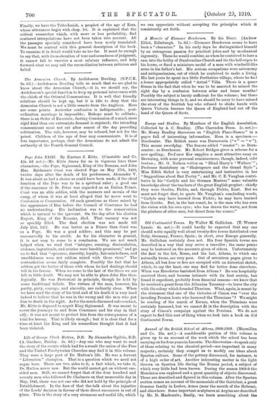Pope John XXIII. By Eustacs J. Kitts. (Constable and Co.
12s. 6d. net.)—Mr. Kitts draws for us in vigorous lines three characters,—the Pope, Sigismuncl, King of the Romans, and John Hus. Baldassare Cossi was elected Pope on May 17th, 1410, twelve days after the death of his predecessor, Alexander V. It was about as bad a choice as could have been made, if the chief function of the Pope was to be a spiritual ruler ; a good one if the successor of St. Peter was regarded as an Italian Mince. Cossi was an able soldier, with the manners and morals of the camp, of whom it was at least alleged that he never went to Confession or Communion. Of such questions as those raised by the appearance of Hus before the Council of Constance he had no understanding. His inclination was to the conservatism which is natural to the ignorant. On the day after his election Rupert, King of the Romans, died. That vacancy was not so speedily filled. The final election was not made till July 21st, 1411. He was better as a Prince than Cossi was - as a Pope. He was a good soldier; and this may be put -unreservedly to his credit. As for his character in general, it is not easy to come to a conclusion. We are not much helped when we read that "intrigue, cunning, dissimulation, ' -violence, ingratitude, and avarice were harshly prominent," and go
• -on to find that "openness, sincerity, loyalty, fair-mindedness, and unselfishness were not seldom mixed with these vices." The contradiction seems fairly complete. Possibly the fact that he seldom got the better of those with whom he had dealings should tell in his favour. When we come to the last of the three we are left in little doubt. We may not be able to place John Hiss theo- logically. He was Protestant in principle, though he held by some traditional beliefs. The virtues of the man, however, his purity, piety, courage, and sincerity, are radiantly clear. When -we have read the story of his trial and of his death it is very hard indeed to believe that he was in the wrong and the men who put him to death in the right. As for the much-discussed safe-conduct, Mr. Kitts is disposed to acquit King Si,gismund. It was meant to cover the journeys to and from Constance and his stay in that cify ; it was not meant to protect him from the consequences of a trial for heresy. That is likely enough ; but it is clear that for a 'time at least the King and his counsellors thought that it had been violated.














































 Previous page
Previous page